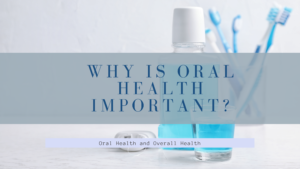
Have you ever found yourself cajoling your children into brushing their teeth properly and thought, “Why am I doing this?” Sure, healthy, sparkling teeth is one benefit, but is there more to it? There certainly is—in fact, oral health and overall health are more connected than you think.
Oral Health and Overall Health
Oral health can tell a lot about your overall health. The state of your teeth and gums can indicate how healthy the rest of your body is, too. However, you might be surprised to learn that your oral health can affect your overall health over time, as well. Oral health and overall health are inextricably linked, and while it makes sense that your general health would impact the health of your teeth and gums, many people are surprised that your general health can sometimes be directly linked to the health of your mouth.
Oral Health Problems Can Indicate Other Health Concerns
Oral health problems in your mouth, teeth, and gums can signal that something is wrong elsewhere in your system. Diabetes, for example, lowers your body’s ability to fight infection, putting you at a higher risk for gum disease. Other conditions, including Alzheimer’s, blood cell disorders, certain cancers, eating disorders, immune deficiencies, HIV/AIDS, osteoporosis, rheumatoid arthritis, and Sjogren’s syndrome (an immune disorder that causes dry mouth) can also cause a decline in oral health. For some, the first hint of these health problems is seen in the mouth. Because of this, it’s essential that you take oral health problems seriously.
Poor Oral Health and Hygiene Can Cause Other Health Problems
When you don’t brush and floss regularly and take good care of your teeth and gums, plaque begins to build up on your teeth. This plaque is the real culprit, it harbors bacteria, which can cause cavities in your teeth, and it can also cause you to develop gum disease. When inflammation of the gums progresses, it impacts the bone that holds your teeth in place and can spread throughout your body. Apart from causing problems to your teeth, gum disease has been linked to several health problems, including cardiovascular disease, endocarditis, pneumonia, and pregnancy complications like premature birth and low birth rates.
Paying Close Attention to Your Oral Health
The link between oral health and overall health has been demonstrated again and again by researchers. Unfortunately, poor oral health is fairly common, and the effects are evident. Currently, tooth decay affects more than 1 in 4 children from ages 2 to 5 in the United States, and it affects 1 in 2 adolescents, aged 12 to 15, in the U.S. This is startling for sure, but adults aren’t fairing much better. In fact, in the U.S., 1 in 7 adults from age 35 to 44 has gum disease, and that increases to 1 in 4 after the age of 65. As a result, 1 in 4 adults aged 65 or older has lost all of their teeth. Thankfully, there is much you can do to maintain your oral health and avoid becoming one of these statistics.
Knowing what should be looking for is a great first step and can help you be proactive with your oral health care. If you notice any of the following signs of gum disease in your children or yourself, you should schedule a visit with the dentist, even if it’s in between your regularly scheduled visits.
- Puffy, red, swollen, or tender gums
- Bleeding gums during or after brushing teeth or flossing
- Receding gums causing teeth to appear longer
- Gums that pull away from the tooth
- Pus between teeth or gums
- Consistent bad breath and/or bad taste in the mouth
- A change in how the teeth fit together when biting down
Why is Oral Health Important When It Comes to Benefiting Overall Health?
Your mouth is the gateway to your overall health. Maintaining excellent and consistent oral health can help your general health, too. Because your mouth provides direct access to your digestive and respiratory system, your gum health can also impact your cardiovascular health. Taking good care of your oral health can help prevent bacterial infections and inflammation in these parts of the body.
Your mouth has natural defenses within your saliva, which can help neutralize bacteria and keep them from multiplying. Good oral hygiene—which includes brushing two times a day for two minutes, daily flossing — helps keep bacteria under control and helps support the body’s natural defenses. As crucial as daily brushing, flossing, and mouthwash are for the entire family, regular visits to the dentist are just as critical. Seeing your dentist for a cleaning every six months is the only way to remove tartar along the gumline. Additionally, it helps your dentist catch anything worrisome early on. If your dentist notices anything they are concerned about, they can address it with you right away and continue to keep a close watch or come up with an action plan. This could be key to preventing future health problems down the road.
No matter how old you are, the more you take care of your oral health, the better chance you have that your body will be healthy, too. Now, that’s something to smile about.
Resources:
https://www.colgate.com/en-us/oral-health/gum-disease/what-are-the-stages-of-gum-disease
https://www.webmd.com/oral-health/features/oral-health-affects-wellness
https://www.mayoclinic.org/healthy-lifestyle/adult-health/in-depth/dental/art-20047475
https://www.ada.org/~/media/ADA/Publications/Files/patient_61.ashx
https://www.healthypeople.gov/2020/leading-health-indicators/2020-lhi-topics/Oral-Health
https://www.mayoclinic.org/diseases-conditions/periodontitis/symptoms-causes/syc-20354473
